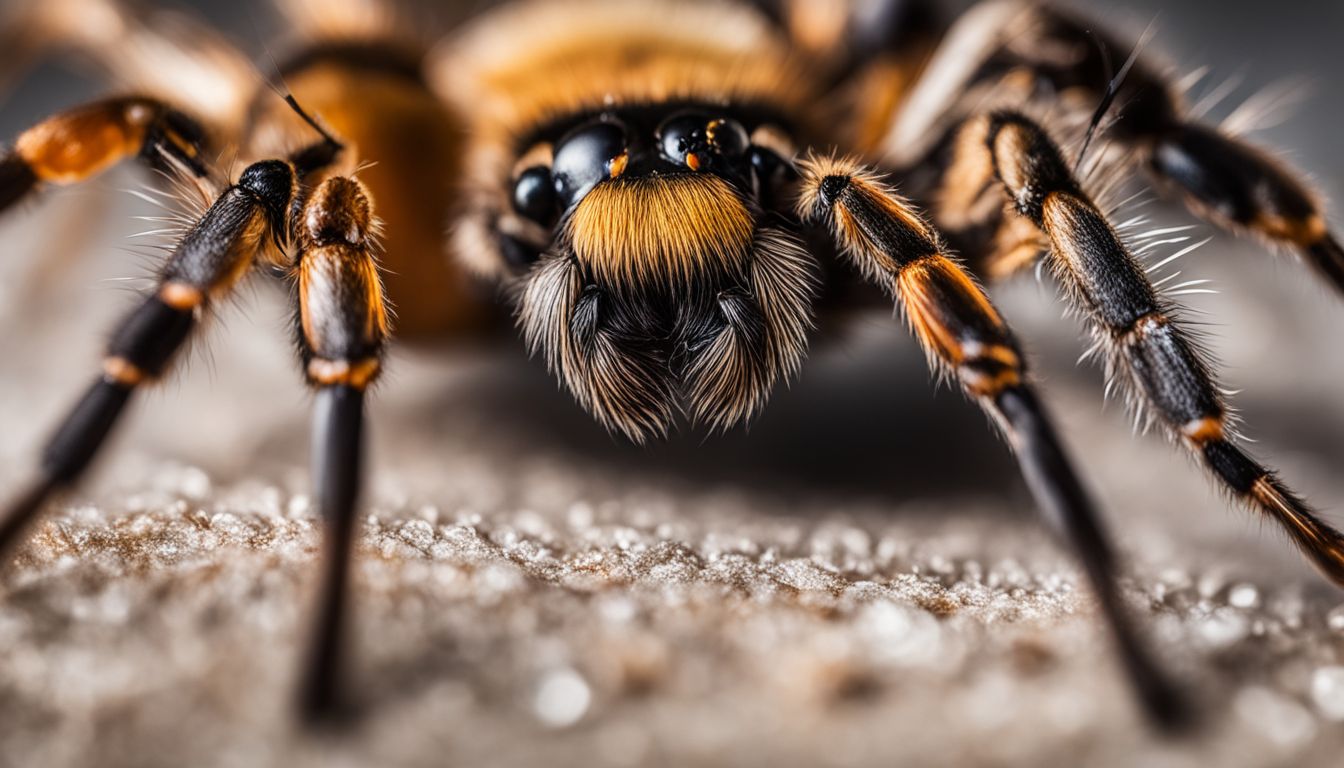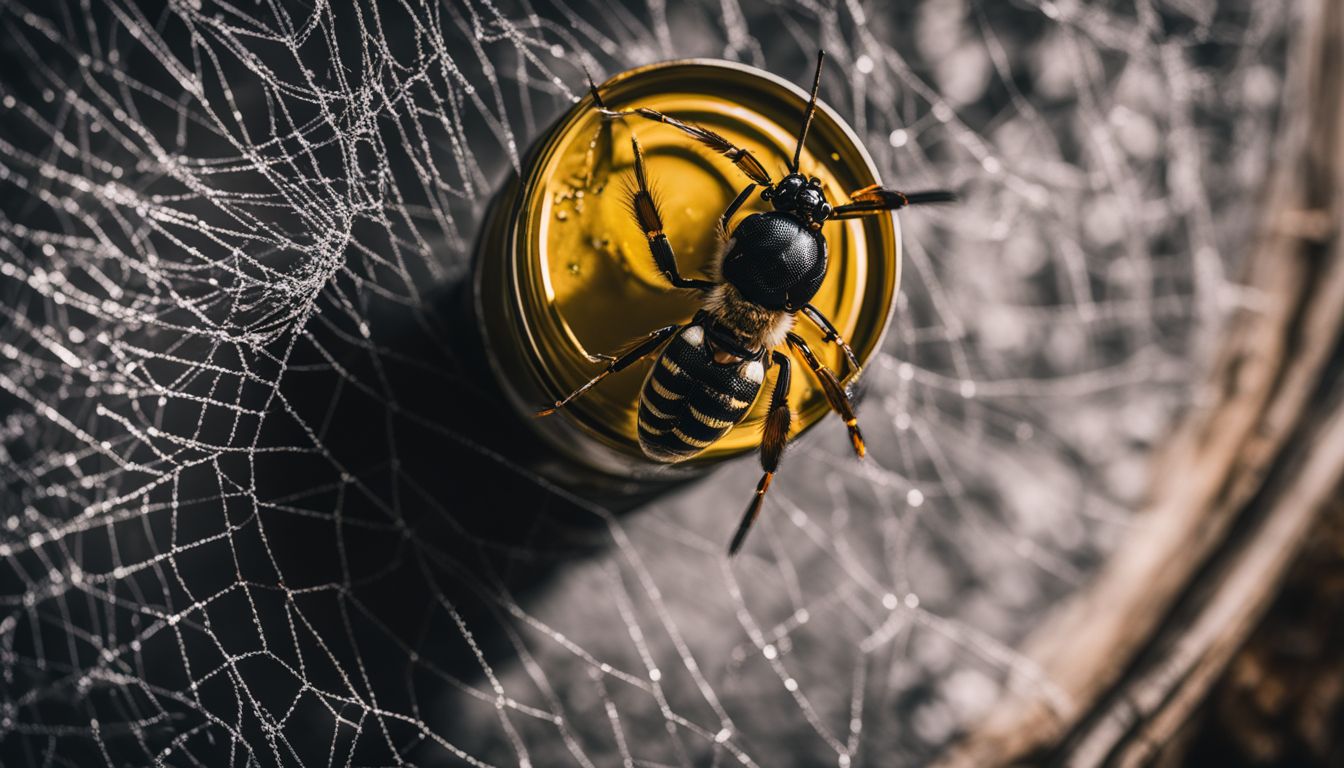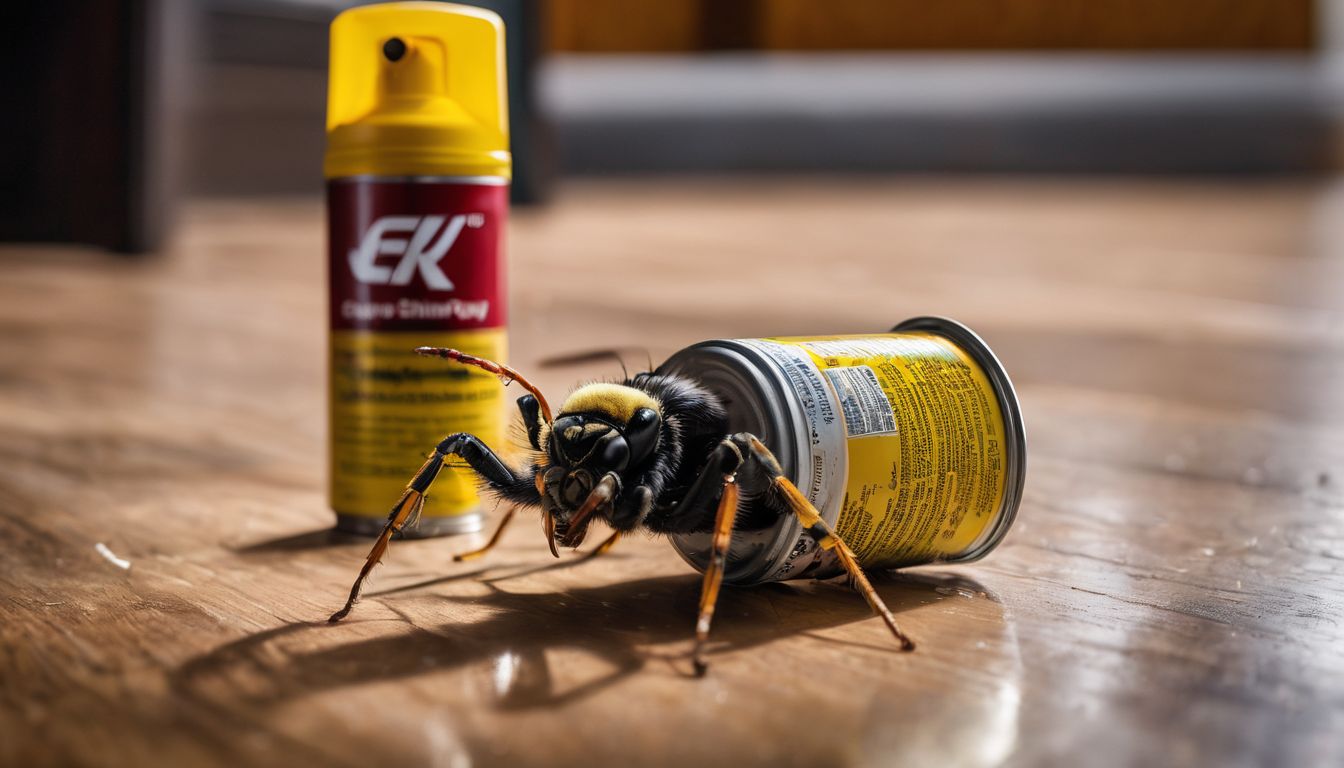Facing a spider problem at home, you might wonder if that can of wasp spray in the garage could be your quick fix. Surprisingly, while wasp spray isn’t designed for spiders, it can pack a punch against these eight-legged critters too.
This article will guide you through understanding if and how your trusty insecticide can tackle more than just flying pests. Stick around to find out safe and effective ways to send spiders packing!
Key Takeaways
- Wasp spray can kill spiders when directly sprayed on them, but it may not be as effective or safe for spider control as alternative spider-specific insecticides and natural preventive measures.
- Some wasp sprays contain chemicals like cypermethrin and geraniol, which can impact spiders by affecting their nervous system or driving them away, but various factors influence the effectiveness of these chemicals on spiders.
- Using wasp spray on spiders poses serious health risks to humans and is not recommended indoors. Safe application guidelines include using it only outdoors, avoiding excessive amounts, and following all instructions on the pesticide label.
- For effective spider control, consider recommended spider-specific insecticides such as Nature-Cide All Purpose Insecticide Spray or Talstar Professional, along with natural preventive measures like using peppermint oil or vinegar solutions to deter spiders without harsh chemicals.
Understanding Spiders and Wasps: Key Differences

Spiders and wasps are both arachnids, but they have distinct anatomical differences. Understanding these differences is crucial in determining the effectiveness of using wasp spray to kill spiders.
Anatomical distinctions between spiders and wasps
Spiders and wasps look different in many ways. Spiders have eight legs and two main body parts – the cephalothorax (which combines their head and chest) and the abdomen. Wasps, on the other hand, have six legs, a pair of wings, and their bodies are split into three segments: head, thorax (chest), and slender waist connecting to the abdomen.
A spider’s body is designed for making webs, biting with fangs, and injecting venom that can subdue prey like bugs. They do not have wings so they cannot fly. Wasps can sting because they have stingers at the end of their abdomens; some wasps use this to paralyze spiders.
Their bodies are tough but move easily when flying or hunting prey.
Can Wasp Spray Effectively Kill Spiders?

Wasp spray contains chemical components that can impact spiders, but its effectiveness depends on various factors. Read more to find out if it’s a suitable option for spider control.
The chemical components of wasp spray and their impact on spiders
Wasp sprays often use chemicals like cypermethrin and imiprothrin. These ingredients attack the nervous system of wasps, making the spray lethal for them. Spiders, while not the main target, can also be harmed by these substances.
Just like wasps, spiders have a nervous system that can be affected by insecticides.
Another common component in some bug sprays is geraniol. This oil comes from plants and can drive bugs away or kill them. Cinnamon oil is sometimes added too and works against pests like spiders.
Although they are designed for wasps, when you spray these chemicals on spiders, it may poison them as well.
Next up: How do other factors play a role in whether wasp spray will work on spiders? Let’s look into what influences its effectiveness.
Factors influencing the effectiveness of wasp spray on spiders
Wasp spray is meant to kill wasps, not spiders. The chemicals in wasp spray affect spiders differently.
- Spider bodies are different from wasp bodies. The sprays close off the breathing of wasps but don’t do the same to spiders.
- Spiders have a unique skin that keeps many chemicals out. This skin stops the poison from hurting them easily.
- Spiders often stay away from areas where sprays have been used. They don’t get as much spray on them as insects do.
- Some sprays can make spiders sick but won’t always kill them. Spiders might walk away before the spray has a chance to work.
- Big spiders like tarantula hawks may need more spray than smaller ones to be affected by it.
- A spider’s place in its web can shield it from getting sprayed well. If it hides, the spray may not reach it.
Safety Concerns and Proper Usage
Use of wasp spray on spiders may pose health risks, and it is important to follow safety guidelines for proper application. Read more about the safe usage of insect sprays in our blog.
Health risks associated with using wasp spray on spiders
Using wasp spray on spiders can pose serious health risks to humans. The chemicals in wasp spray may harm your respiratory system, causing breathing difficulties and lung irritation if inhaled.
Additionally, exposure to these pesticides can lead to eye and skin irritation, damage to the central nervous system, kidneys, and even increase the risk of birth defects or fetal death for pregnant women.
Furthermore, inhaling bug spray meant for wasps or other insects can result in symptoms of poisoning, leading to life-threatening breathing problems. It’s important to understand that using insecticides like wasp spray indoors increases the risk of exposure and potential harm from these toxic chemicals not only to spiders but also to yourself and others in the household.
Guidelines for safe application of wasp spray
To safely apply wasp spray, follow these guidelines:
- Use it only outdoors to avoid indoor exposure to toxic chemicals, and prevent harm to beneficial organisms.
- Avoid using excessive amounts of pesticide to minimize potential health effects on humans, animals, and the environment.
- Do not direct the spray towards water sources or areas where bees and other pollinators might be present.
- Ensure proper storage of the spray, away from children and pets, to prevent accidental exposure.
- Carefully read and follow all instructions on the pesticide label for safe and effective application.
Alternatives to Wasp Spray for Spider Control
Explore recommended spider-specific insecticides, natural and preventive measures against spiders, and the role of light in attracting or deterring spiders. Learn more about effective ways to control spiders without using wasp spray.
Recommended spider-specific insecticides
If you’re looking for effective spider-specific insecticides, there are several options available to help you control and eliminate spider populations. Here are some recommended insecticides to consider:
- Nature-Cide All Purpose Insecticide Spray is a natural and non-toxic option that effectively kills spiders both indoors and outdoors.
- Talstar Professional is a highly effective spider spray that provides immediate contact kill and residual control against spiders in various settings.
- Raid hornet killer, when used correctly, can also be an alternative for killing spiders, offering convenience and effectiveness as a spider control option.
- Cynoff EC, DeltaDust, DeltaGard granules, Drione dust, and Suspend SC are pesticides labeled for use specifically against spiders, providing targeted control in different environments.
- Biological control agents offer an alternative to traditional pesticides for controlling spider populations, providing environmentally-friendly options for managing spiders in your home.
Natural and preventive measures against spiders
After exploring recommended spider-specific insecticides, let’s delve into natural and preventive measures against spiders. Here are some simple yet effective methods to keep spiders at bay:
- Use peppermint essential oil: Spiders dislike the smell of peppermint oil. Mix a few drops with water in a spray bottle and apply it around windows, doors, and other entry points to create a natural barrier.
- White vinegar solution: A mixture of half white vinegar and half water can be sprayed in corners, cracks, and crevices to deter spiders naturally due to its strong odor.
- Citrus peels: Save citrus peels from oranges, lemons, or grapefruits and rub them along baseboards, windowsills, and bookshelves as the scent repels spiders.
The role of light in attracting or deterring spiders
When it comes to keeping spiders at bay, the role of light is significant. While light itself doesn’t directly attract spiders, it does lure the insects that spiders feed on. Turning off unnecessary outdoor lights can help deter these insects, subsequently reducing the spider population around your home.
By minimizing external lighting when not needed, you can create an environment less hospitable to both the insects and the spiders that rely on them for food.
By being mindful of outdoor lighting usage, you can indirectly discourage insects from congregating near your home and consequently minimize the presence of their arachnid predators.
Conclusion
In conclusion, while wasp spray may have some effectiveness in killing spiders, it is not the most recommended or safest method. There are alternative spider-specific insecticides and natural preventive measures that can be more effective for controlling spiders in the long run.
Summary of wasp spray’s effectiveness on spiders
Wasp spray can kill spiders when directly sprayed on them. However, residual sprays designed for wasp control may not be as effective against spiders. Different types of wasp sprays have varying levels of efficacy in killing specific spider species, and ongoing discussions and experiments are exploring their effectiveness in instantly killing spiders or their eggs.
Some spider-hunting wasps have stings that can paralyze or even kill the spider, adding to the complexity of understanding the overall impact of wasp spray on spiders.
In addition to the direct effect on spiders, it’s important to consider safety concerns and proper usage when using wasp spray for spider control. Understanding these factors can help novices make informed decisions about using wasp spray as a method for controlling spiders in their surroundings.
Final recommendations for spider control
After considering the effectiveness of wasp spray on spiders, it’s important to highlight some final recommendations for spider control. When dealing with these pests, it’s crucial to focus on preventive measures such as sealing cracks and gaps in homes, reducing clutter where spiders can hide, and using sticky traps to catch spiders.
Additionally, using natural methods like essential oils or vinegar sprays can deter spiders from entering living spaces. Remember that controlling spider populations might require a combination of approaches, including both chemical and non-chemical methods based on the severity of infestation.
Using Nature-Cide All Purpose Insecticide Spray is highly recommended for effective spider control in 2023 due to its proven results and safety features. Remember that biological control methods involving natural predators like spider wasps can also contribute significantly to managing spider populations without relying solely on chemical pesticides.
FAQs
1. Can wasp spray kill spiders like the brown recluse and black widow?
Yes, wasp spray can be used to kill venomous spiders such as the brown recluse and black widow because it has chemicals that attack their nervous system.
2. Is using wasp spray on spiders a good pest control method?
While wasp spray might work on spiders, it’s not the best choice for controlling household pests like spiders since there are better ways designed just for them.
3. Are spider bites dangerous enough to use wasp spray?
Spider bites from brown recluses or black widows can be very harmful because of their venom, but you should use products made specifically for spiders instead of wasp spray.
4. Will spraying an egg sac with wasp spray stop more spiders?
Using wasp spray on egg sacs may prevent baby spiders from coming out by poisoning them, but remember to handle these cases carefully or call pest control experts if unsure.
5. What happens when a spider is sprayed with chemicals like prallethrin in the aerosol cans?
When sprayed with an aerosol that contains prallethrin, a spider’s respiratory organs get poisoned which can make it hard for them to breathe and may lead to death.




